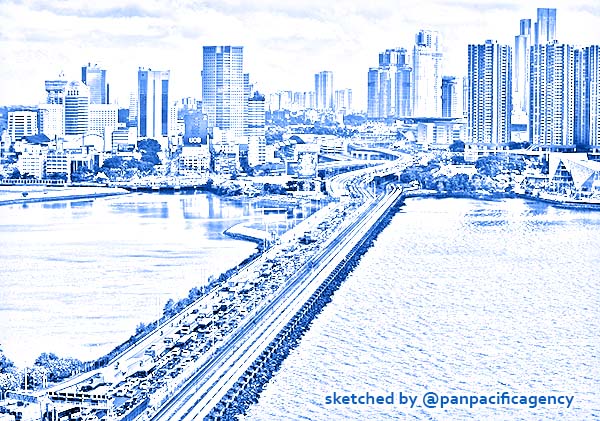Singapore reviews inflation forecasts as core prices near 8-year high

Commuters take the Woodlands Causeway to Singapore from Johor a day before Malaysia imposes a lockdown on travel due to the coronavirus outbreak in Singapore March 17, 2020. REUTERS/Edgar Su. Sketched by the Pan Pacific Agency.
SINGAPORE, Jan 24, 2022, Reuters. Singapore is reviewing its official inflation forecasts, authorities said on Monday, after data showed its key price gauge climbed in December by the fastest pace in nearly eight years, driven by a steep increase in air fares, Reuters reported.
The core inflation rate — the central bank’s favoured price measure – rose to 2.1% in December on a year-on-year basis, the highest since July 2014 and topping economist forecasts. A Reuters poll of economists had forecast a 1.7% increase.
Singapore’s central bank tightened its monetary policy in October, delivering its first such move in three years, amid mounting cost pressures. Its next policy review is scheduled for April when it is widely expected by economists to tighten further.
Monday’s data showed headline inflation rose by 4%, a near nine-year high, beating economists’ forecast of 3.75%.
Steep increases in air fares and COVID-19 testing costs under Singapore’s quarantine-free travel schemes were a major factor in December’s price jump.
There remains significant uncertainty surrounding the outlook for inflation in the near term, including from the costs of air travel and commodity prices such as food and oil, the Monetary Authority of Singapore (MAS) and the Ministry of Trade and Industry (MTI) said in a statement.
“Given the recent stronger-than-projected inflation outturns, including the sharp uptick in air fares, MAS and MTI are reviewing the current forecast ranges for CPI-All Items inflation and MAS Core Inflation in 2022,” they said.
The government had a previous forecast for 2022 headline prices to average 1.5–2.5% and core inflation to increase to 1-2%. For 2021, core inflation came in at 0.9% and headline prices rose to 2.3%.
Inflation is surging around the world as economies recover from the pandemic, creating demand as a time when bottlenecks in transportation are causing shortages in various commodities and goods.